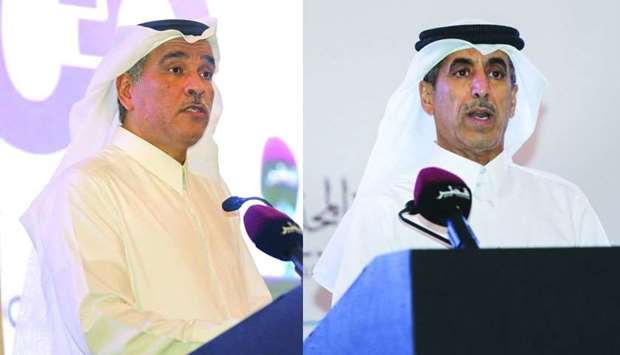The fifth edition of the Humanities Conference by Community College of Qatar (CCQ) served as a platform to highlight the challenges and opportunities for sustainable peace from different perspectives, including family, gender roles, people with disabilities, minority groups, traditions, religion, education, government, economics, the media, environment and globalisation.
The conference, recently held under the theme 'Cultivating a Culture of Sustainable Peace: Approaches to Peacebuilding in a Changing World', was aimed at disseminating knowledge and promoting the social and intellectual development of CCQ students and the wider community.
The event saw the participation of HE the Undersecretary at the Ministry of Education and Higher Education Dr Ibrahim bin Saleh al-Naimi and Wijdan Cultural Centre deputy director Khalid bin Ghanim al-Ali alongside more than 30 scholars, specialists and researchers in the field, including CCQ students.
HE Dr al-Naimi, while delivering the keynote address, called for efforts to strengthen the role of educational institutions in combating hate speech, promoting peace and drying up the intellectual roots of extremism.
“All parties concerned must work together to enhance the role of educational institutions in spreading the culture of peace. They should ensure the openness of educational institutions in a bid to establish relations with civil society institutions,” he said, adding that textbooks provided to students should be reviewed in order to ensure that they are free from incorrect texts.
He also highlighted the protection of learners from the impact of educational programmes that direct towards hate speech and said education is aimed at personal development and should based on the values of co-existence, peace and dialogue.
“The role of education is no longer limited to nurturing educated and productive minds for the benefit of society. It further extends to developing independent and morally conscious minds through promotion of peace and the development of behavioural skills,” he said.
Elaborating on the conference theme, CCQ president Dr Mohamed al-Naemi said the conference is held to explore and help redefine peace as an active process.
“It was Ralph Waldo Emerson who emphasised that peace cannot be achieved through violence, but only through understanding. Therefore, if we are to attain peace, especially on a global scale, the world must first come to a universal understanding. We see the conference as an important starting point for finding innovative new ways to resolve conflicts, end war and achieve peace,” he said.
Al-Ali focused on the concept of positive co-existence and said peace cannot be achieved until requirements of achieving human dignity are examined.
“Laws, legislation and other measures are necessary for peace-building. But, the most important aspect to consider is positive coexistence within and between societies. Ultimately, positive coexistence can be considered as the guarantor of our survival and stability. And it’s what paves the way for development,” he said.
The conference featured two plenary panel discussions that examined the interconnection between psycho-social development and religion along with peace-making processes among marginalised communities.
Apart from CCQ students, the two-day event witnessed the participation of experts and speakers from eminent national and international institutions, including Texas A&M University at Qatar, Hamad Bin Khalifa University, Qatar University, Canterbury Christ Church University, UK, Islamic University College of Perlis, Malaysia, Emir Abd ElKader University for Islamic Sciences, Algeria, University of Batna, Algeria, Qatar Red Crescent Society, Wijdan Cultural Centre, the Family Counselling Centre, Ministry of Endowments and Islamic Affairs and Ministry of Interior.

